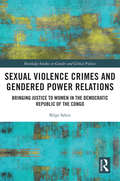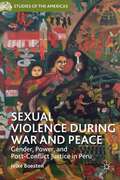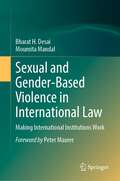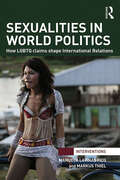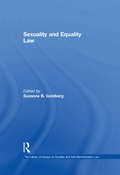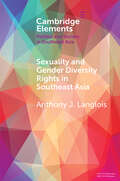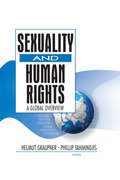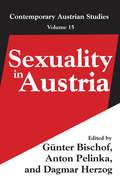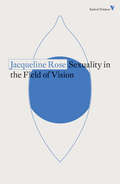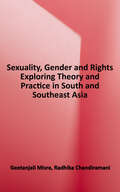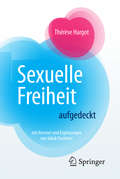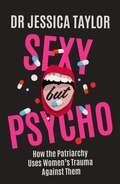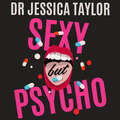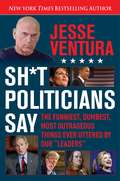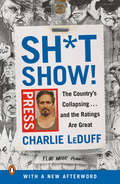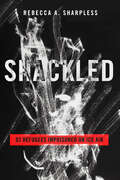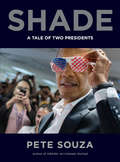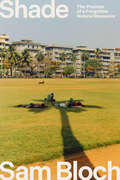- Table View
- List View
Sexual Violence Crimes and Gendered Power Relations: Bringing Justice to Women in the Democratic Republic of the Congo (Routledge Studies in Gender and Global Politics)
by Bilge SahinThis book provides a robust gendered analysis and establishes a feminist approach to international actors’ responses to sexual violence crimes in conflict in eastern Democratic Republic of the Congo (DRC) and the impact of these global political practices on local gendered power relations. Sexual violence crimes in eastern DRC have received significant global attention and triggered calls by the international community to end this violence. This book critically assesses international assistance to the Congolese legal system to challenge sexual violence crimes, to determine to what extent it engages with the continuum of gendered violence from peacetime to conflict. It also examines whether international assistance has produced any transformations in gendered power relations in eastern DRC. The author investigates how challenging sexual violence crimes in conflict necessitates broader female empowerment and engagement with gendered power relations. This book will be of interest to scholars and postgraduate students in gender studies, development studies and international relations. It will also provide significant guidance for professionals working for development agencies and international NGOs focusing on eastern DRC.
Sexual Violence during War and Peace
by Jelke BoestenUsing the Peruvian internal armed conflict as a case study, this book examines wartime rape and how it reproduces and reinforces existing hierarchies. Jelke Boesten argues that effective responses to sexual violence in wartime are conditional upon profound changes in legal frameworks and practices, institutions, and society at large.
Sexual and Gender-Based Violence in International Law: Making International Institutions Work
by Bharat H. Desai Moumita MandalThis book addresses sexual and gender-based violence (SGBV) against women from an international law point of view. It identifies the reasons behind SGBV against women with a specific focus on cultural practices that try to justify it and highlights the legal challenges related to the topic for both national and international justice systems. The seven chapters of the book are: i) Introduction ii) SGBV a global concern; iii) International legal protection; iv) Role of international institutions; v) Role of cultural factors and vi) Challenges vii) Conclusions. In the light of concerted global efforts to bring to an end, or at least severely contain SGBV against women, the book provides a future roadmap to the United Nations system, States, international institutions, multidisciplinary scholars, civil society organizations and other global actors.The book contains a Foreword by Peter Maurer, President of International Committee of the Red Cross (ICRC).
Sexualities in World Politics: How LGBTQ claims shape International Relations (Interventions)
by Markus Thiel Manuela Lavinas PicqAs LGBTQ claims acquire global relevance, how do sexual politics impact the study of International Relations? This book argues that LGBTQ perspectives are not only an inherent part of world politics but can also influence IR theory-making. LGBTQ politics have simultaneously gained international prominence in the past decade, achieving significant policy change, and provoked cultural resistance and policy pushbacks. Sexuality politics, more so than gender-based theories, arrived late on the theoretical scene in part because sexuality and gender studies initially highlighted post-structuralist thinking, which was hardly accepted in mainstream political science. This book responds to a call for a more empirically motivated but also critical scholarship on this subject. It offers comparative case-studies from regional, cultural and theoretical peripheries to identify ways of rethinking IR. Further, it aims to add to critical theory, broadening the knowledge about previously unrecognized perspectives in an accessible manner. Being aware of preoccupations with the de-queering, disciplining nature of theory establishment in the social sciences, we critically reconsider IR concepts from a particular LGBTQ vantage point and infuse them with queer thinking. Considering the relative dearth of contemporary mainstream IR-theorizing, authors ask what contribution LGBTQ politics can provide for conceiving the political subject, as well as the international structure in which activism is embedded. This book will be of interest to students and scholars of gender politics, cultural studies and international relations theory.
Sexuality Reimagined: MSM in Modern India
by Shailja TandonThe book examines how medical knowledge is produced around bodies that do not fit in the heteronormative framework of the state’s rationale and processes. The marginal bodies studied in this research are termed MSM, men who have sex with men, categorized as a high-risk group in the backdrop of HIV/AIDS. These Queer bodies entered the registers of epidemiology and governmentality. This classification is the point of departure for the book. The book interrogates and asks how does a sexual subject become a political question? To answer this political trajectory, the book analyses the category of risk in biomedicine. It investigates how the category of risk becomes critical to the Indian state’s rationale and policies wherein, through the ambit of health and population, sexuality is managed. Unearthing the sexual politics in South Asia, the book, based on rich empirical evidence derived from the lived experiences of MSM, narrates the construction of sexual subjectivity and masculinity. The process of construction occurs in negotiation with the Indian state, bringing forth the dimension of the Indian state as a medico-legal governmentality regime and how MSM takes on the identity of a medicalized subject.
Sexuality and Equality Law (The\library Of Essays On Equality And Anti-discrimination Law Ser.)
by Suzanne B. GoldbergSexual rules and regulations are among society‘s oldest yet it is only in recent decades that this once-stigmatized field has become the focus of scholarly attention. This volume, which includes some of the most thought-provoking and hard-to-find essays in the field, covers a diverse range of topics from sexual orientation and gender identity to intersexuality and commercial sex, and from HIV/AIDS and trafficking to polygamy. Through historical, political and critical-theoretical lenses, and through a global focus, the selections ask how we conceptualize the groups and acts subjected to sexual regulation and how regulations in the field implicate and produce understandings of sexuality and identity. By placing this variety of works together, Sexuality and Equality Law invites fresh insights into commonalities and synergies across regulatory arenas that are often isolated from one another. The volume‘s introduction situates all of these works in the broader field and offers readers an extensive bibliography.
Sexuality and Gender Diversity Rights in Southeast Asia (Elements in Politics and Society in Southeast Asia)
by Anthony J LangloisSexuality and gender diversity rights in Southeast Asia are deeply controversial and vigorously contested. Debate and protest have been accompanied by both legislative reform and discriminatory violence. These contradictory dynamics are occurring at a time when the international human rights regime has explicitly incorporated a focus on the prevention of violence and discrimination in relation to sexuality and gender diversity. This Element focusses on the need for such rights. This Element explores the burgeoning of civil society organisations engaged in an emancipatory politics inclusive of sexuality and gender diversity, utilising rights politics as a platform for visibility, contestation and mobilisation. This Element focusses on the articulation of political struggle through a shared set of rights claims, which in turn relates to shared experiences of violence and discrimination, and a visceral demand and hope for change.
Sexuality and Globalization: An Introduction to a Phenomenology of Sexualities
by Christopher Edwards Laurent BibardThe book argues that a universally widespread virility currently prevents humans from realizing their sexualities, which are originally the feminine and the masculine. This obstacle may be traced back to Renaissance humanism, whose core intention is to take control over the so-called 'nature. "
Sexuality and Human Rights: A Global Overview
by Phillip TahmindjisFinally-a comparative overview of sexuality and human rights issues and law!Human rights issues exist globally, particularly when they have to do with sexuality. Sexuality and Human Rights: A Global Overview focuses on the controversial issues of human sexuality and the legal challenges that LGBT individuals face. Internationally recognized legal experts thoroughly discuss the status of important human rights laws pertaining to sexuality from around the world. Reviewing the progression from historical foundations and shifting public opinions through the most recent landmark legal cases, this is an essential resource on the present state of human rights laws and sexuality.This unique, up-to-date examination of the legal issues involving LGBT individuals&’ rights around the world reviews the latest rulings, such as the adoption of minors by homosexual or bisexual parents, the legal acceptance of marriage between same-sex couples, whether the gender-reassigned can be legally considered their true gender identity, and much, much more. Sexuality and Human Rights: A Global Overview illustrates the journey our worldwide legal systems have traveled, and the path stretching before them, until the destination of equality and acceptance in sexuality may finally be reached. Well-referenced, comprehensive, and yet accessible to the general reader, this book provides a crucial, provocative look at just what basic sexual human rights means in today&’s laws.Some of the topics of Sexuality and Human Rights: A Global Overview include: perspectives and objectives to challenge discrimination sexuality and international human rights law sexuality and human rights in Australian law transsexuals issues in European human rights law sexual orientation and gender identity legal issues in North America the present state of sexuality and human rights in European law the Asian legal perspective on sexuality and human rights laws pertaining to sexual identity issuesSexuality and Human Rights: A Global Overview is a vital reference source for law educators, law students, gay rights activists, and law reformers.
Sexuality in Austria: Volume 15 (Contemporary Austrian Studies #Vol. 15)
by Dagmar Herzog Anton Pelinka Günter BischofScholars have increasingly been investigating human sexuality as an important field of social history in particular national cultures. This volume examines both continuities and changing patterns of sexual behavior in Austria.
Sexuality in the Field of Vision (Radical Thinkers Ser.)
by Jacqueline RoseA brilliantly original exploration of the interface between feminism, psychoanalysis, semiotics and film theory.
Sexuality, Gender and Rights: Exploring Theory and Practice In South and Southeast Asia
by Geetanjali Misra Radhika ChandiramaniThere is virtually no record of work on sexuality and rights in South and Southeast Asia and even less to show how theory can link to practice. This volume fills the gap by demonstrating how the ideas of scholars and activists can be converted into action that can make a difference to people′s lives. The 15 original essays span eight countries and analytically document on-going work in areas such as: sexuality education; sexual health services; sexual rights; transexuality; and HIV/AIDS prevention. They also offer a variety of strategies in advocacy, service delivery, education, training and media outreach activities.
Sexuality: The 1964 Clermont-Ferrand and 1969 Vincennes Lectures (Foucault's Early Lectures and Manuscripts)
by Michel FoucaultMichel Foucault’s The History of Sexuality—the first volume of which was published in 1976—exerts a vast influence across the humanities and social sciences. However, Foucault’s interest in the history of sexuality began as early as the 1960s, when he taught two courses on the subject. These lectures offer crucial insight into the development of Foucault’s thought yet have remained unpublished until recently.This book presents Foucault’s lectures on sexuality for the first time in English. In the first series, held at the University of Clermont-Ferrand in 1964, Foucault asks how sexuality comes to be constituted as a scientific body of knowledge within Western culture and why it derived from the analysis of “perversions”—morbidity, homosexuality, fetishism. The subsequent course, held at the experimental university at Vincennes in 1969, shows how Foucault’s theories were reoriented by the events of May 1968; he refocuses on the regulatory nature of the discourse of sexuality and how it serves economic, social, and political ends. Examining creators of political and literary utopias in the nineteenth and twentieth centuries, from Sade to Fourier to Marcuse, who attempted to integrate “natural” sexualities, including transgressive forms, into social and economic life, Foucault elaborates a double critique of the naturalization and the liberation of sexuality. Together, the lectures span a range of interests, from abnormality to heterotopias to ideology, and they offer an unprecedented glimpse into the evolution of Foucault’s transformative thinking on sexuality.
Sexualität und Macht in der Polizei: Eine multiperspektivische Fallanalyse
by Christian Barthel Claudia PuglisiEin hochrangiger Polizeibeamter bietet einer Angestellten eine Beförderung an und fragt sie dabei, ob sie sich „hochschlafen“ wolle. Die Frau weist ihn zurück und behält den Vorfall jahrelang für sich. Zuvor hatte sie in der Polizei vergeblich um Unterstützung ersucht. Erst Jahre später taucht dieser Polizeibeamte in den Schlagzeilen auf, weil er seiner jungen Kripochefin nachgestellt haben soll. Erst daraufhin wird er aufgrund der Anzeige der Angestellten rechtskräftig verurteilt. Diesen konkreten Rechtsfall sexualisierter Grenzüberschreitung, nehmen die Herausgeber des Buches als Anlass interdisziplinär zu untersuchen, wie Mechanismen der Skandal- und Krisenbewältigung und die damit einhergehenden Formen der institutionellen Abwehr in der Organisation Polizei wirken. Das Wegsehen und rationalisierende Verdrängen seitens Vorgesetzter, Kolleginnen und Kollegen ist unbedingt aufklärungsbedürftig. Ziel des Buches ist die Schaffung einer interdisziplinären Grundlage für die Reflexion vergleichbarer Fälle in der „Organisation mit Gewaltlizenz“ und damit die Initiierung eines organisationalen Lernprozesses, der solche Fälle zu verhindern hilft.
Sexuelle Freiheit aufgedeckt
by Thérèse Hargot Jakob Pastötter Lydia LundbeckWas haben wir aus der sexuellen Befreiung gemacht? Nach 50 Jahren sexueller Revolution ist so viel Sex im öffentlichen Raum wie seit der Antike nicht mehr. Doch wie beeinflusst dies die heutigen Jugendlichen? Dieses Buch deckt Auswirkungen und Zusammenhänge der sexuellen Befreiung auf. Basierend auf langjähriger Erfahrung in der schulischen Sexualaufklärung und gestützt durch viele anschauliche Beispiele schildert die Autorin minutiös und bisweilen erfrischend maliziös, was und wie Jugendliche und junge Erwachsene heute über Sexualität denken. Obwohl sich diese sexuell befreit fühlen, unterliegen sie doch vielfältigen Zwängen. Ohne ein Blatt vor den Mund zu nehmen vermittelt die Autorin anhand von vielen Beispielen, welche Auswirkungen Faktoren wie eine Bagatellisierung der Porno-Kultur, permanentes Leistungsstreben, hormonelle Verhütung und eine zwanghafte Suche nach sexueller Orientierung nach sich ziehen. Dabei wird deutlich, dass es ein Irrglaube ist, dass sich die Sexualität als Konsumgut instrumentalisieren und beherrschen, pädagogisch vermitteln, sozial konstruieren sowie pharmazeutisch und chirurgisch optimieren lässt. Das reale Liebesleben könnte sonst viel Leere, Frustration, Verunsicherung und Einsamkeit erfahren. Das Buch regt dazu an, das Wagnis einzugehen, sich den damit verbundenen Fragen des Lebens zu stellen und den Lernprozess der Sozialisierung im Bereich von Liebe, Sex und Beziehungen neu zu überdenken.
Sexuelle und geschlechtsspezifische Gewalt im internationalen Recht: Internationale Institutionen zum Funktionieren bringen
by Bharat H. Desai Moumita MandalDieses Buch behandelt sexuelle und geschlechtsspezifische Gewalt (SGBV) gegen Frauen aus völkerrechtlicher Sicht. Es zeigt die Gründe für SGBV gegen Frauen auf, wobei der Schwerpunkt auf kulturellen Praktiken liegt, mit denen versucht wird, sie zu rechtfertigen, und verdeutlicht die rechtlichen Herausforderungen im Zusammenhang mit dem Thema sowohl für nationale als auch internationale Justizsysteme. Die sieben Kapitel des Buches sind: i) Einleitung ii) SGBV ein globales Problem; iii) Internationaler Rechtsschutz; iv) Rolle der internationalen Institutionen; v) Rolle kultureller Faktoren und vi) Herausforderungen vii) Schlussfolgerungen. Vor dem Hintergrund konzertierter globaler Bemühungen, SGBV gegen Frauen zu beenden oder zumindest stark einzudämmen, bietet das Buch einen Fahrplan für das System der Vereinten Nationen, Staaten, internationale Institutionen, multidisziplinäre Wissenschaftler, Organisationen der Zivilgesellschaft und andere globale Akteure.Das Buch enthält ein Vorwort von Peter Maurer, Präsident des Internationalen Komitees vom Roten Kreuz (IKRK).
Sexy But Psycho: How the Patriarchy Uses Women’s Trauma Against Them
by Dr Jessica TaylorThe new book from the bestselling author of Why Women Are Blamed for EverythingAngry, opinionated, mouthy, aggressive, hysterical, mad, disordered, crazy, psycho, delusional, borderline, hormonal . . . Women have long been pathologized, locked up and medicated for not conforming to whichever norms or stereotypes are expected of them in that time and space. Sexy But Psycho is a challenging and uncomfortable book which seeks to explore the way professionals and society at large pathologize and sexualise women and girls. Utilising decades of research, real case studies and new data from her own work, Dr Taylor's book will critically analyse the way we label women with personality disorders. Why are women and girls pathologized for being angry about oppression and abuse? How have so many women been duped into believing that they are mentally ill, for having normal and natural reactions to their experiences? Sexy But Psycho argues that there is a specific purpose to convincing women and girls that they are mentally ill, as the world avoids addressing violence against women and their centuries of ignored trauma.
Sexy But Psycho: How the Patriarchy Uses Women’s Trauma Against Them
by Dr Jessica TaylorTHE SUNDAY TIMES BESTSELLERAngry, opinionated, mouthy, aggressive, hysterical, mad, disordered, crazy, psycho, delusional, borderline, hormonal . . . Women have long been pathologized, locked up and medicated for not conforming to whichever norms or stereotypes are expected of them in that time and space. Sexy But Psycho is a challenging and uncomfortable book which seeks to explore the way professionals and society at large pathologize and sexualise women and girls. Utilising decades of research, real case studies and new data from her own work, Dr Taylor's book will critically analyse the way we label women with personality disorders. Why are women and girls pathologized for being angry about oppression and abuse? How have so many women been duped into believing that they are mentally ill, for having normal and natural reactions to their experiences? Sexy But Psycho argues that there is a specific purpose to convincing women and girls that they are mentally ill, as the world avoids addressing violence against women and their centuries of ignored trauma.
Sh*t Joe Rogan Says: An Unauthorized Collection of Quotes and Common Sense from the Man Who Talks to Everybody
by Mary Wood&“The answer is not to silence me. . . . The answer is for you to have better arguments.&”Go the Joe Rogan way. Sh*t Joe Rogan Says is a book of motivation, inspiration, and reflections from the man who talks to everybody. Not one to back down from a conversation or an f-bomb, Joe Rogan tells it like it is and gives everyone a fair shake.From years of discipline and expertise in martial arts, to unabashed comedy and showing people how to face their fears, to his stratospheric ascent to podcast greatness, Joe Rogan knows a little something about life, discipline, hard work, and an unrelenting pursuit of personal freedoms and free thought. Get Joe Rogan&’s take on philosophy, comedy, politics, free speech, mind-altering experiences, censorship, and happiness with this collection of his most influential quotes and ideas. Get your hands on 150 Joe Rogan-isms on life, free thought, and common senseFind motivation, momentum, and real talk in Joe Rogan&’s no-nonsense reflectionsFollow the Joe Rogan route to achieve confidence, nonconformity, and an uncensored life
Sh*t My Vice-President Says
by Threshold Editions"Hillary Clinton is as qualified or more qualified than I am to be vice president of the United States of America. Quite frankly, it might have been a better pick than me." But would she have given us so many priceless verbal gaffes? George W. Bush has left the White House, but Vice President Joe Biden continues his hilarious legacy of memorable misstatements and spoken-word screw-ups. "Look, John (McCain)'s last-minute economic plan does nothing to tackle the number one job facing the middle class, and it happens to be, as Barack says, a three-letter word: jobs. J-O-B-S, jobs." "Stand up, Chuck, let 'em see ya." (to Missouri state senator Chuck Graham, who is in a wheelchair) Sh*t My Vice President Says captures every entertaining gem, with extra special commentary and a selection of winning quips from Biden's silver-tongued compatriots, such as Nancy Pelosi, Rahm Emanuel, and more!
Sh*t Politicians Say: The Funniest, Dumbest, Most Outrageous Things Ever Uttered By Our "Leaders"
by Jesse VenturaFrom the moment a Founding Father first asked for a vote, politicians have been saying dumb stuff. From George Washington to George Bush (both of them!) right on to present-day pundits like Donald Trump, Sarah Palin, and Hillary Clinton, political leaders can always be counted on to say funny, exasperating, and nonsensical things, often unintentionally. In Sh*t Politicians Say, Jesse Ventura shares the most entertaining and disturbing ?thoughts” from his political brethren, including these winners: "The concept of global warming was created by and for the Chinese in order to make U.S. manufacturing non-competitive.” —Donald Trump "I am not worried about the deficit. It is big enough to take care of itself.” —Ronald Reagan "I think gay marriage is something that should be between a man and a woman.” —Arnold Schwarzenegger "I love California, I practically grew up in Phoenix.” —Dan Quayle "A zebra does not change its spots.” —Al Gore "People have got to know whether or not their president is a crook. Well, I’m not a crook. I’ve earned everything I’ve got.” —Richard Nixon "Death has a tendency to encourage a depressing view of war.” —former Defense Secretary Donald Rumsfeld "I’ll be long gone before some smart person ever figures out what happened inside this Oval Office.” —George W. Bush From bigoted statements to outright lies . . . flip-flopping to just TMI, Sh*t Politicians Say will provide readers with a welcome respite from the presidential campaigns.
Sh*tshow!: The Country's Collapsing . . . and the Ratings Are Great
by Charlie LeDuffA daring, firsthand, and utterly-unscripted account of crisis in America, from Ferguson to Flint to Cliven Bundy's ranch to Donald Trump's unstoppable campaign for President--at every turn, Pulitzer-prize winner and bestselling author of Detroit: An American Autopsy, Charlie LeDuff was thereIn the Fall of 2013, long before any sane person had seriously considered the possibility of a Trump presidency, Charlie LeDuff sat in the office of then-Fox News CEO Roger Ailes, and made a simple but prophetic claim: The whole country is bankrupt and on high boil. It’s a shitshow out there. No one in the bubbles of Washington, DC., New York, or Los Angles was talking about it--least of all the media. LeDuff wanted to go to the heart of the country to report what was really going on. Ailes baulked. Could the hard-living and straight-shooting LeDuff be controlled? But, then, perhaps on a whim, he agreed. And so LeDuff set out to record a TV series called, "The Americans," and, along the way, ended up bearing witness to the ever-quickening unraveling of The American Dream.For three years, LeDuff travelled the width and breadth of the country with his team of production irregulars, ending up on the Mexican border crossing the Rio Grande on a yellow rubber kayak alongside undocumented immigrants; in the middle of Ferguson as the city burned; and watching the children of Flint get sick from undrinkable water. Racial, political, social, and economic tensions were escalating by the day. The inexorable effects of technological change and globalization were being felt more and more acutely, at the same time as wages stagnated and the price of housing, education, and healthcare went through the roof. The American people felt defeated and abandoned by their politicians, and those politicians seemed incapable of rising to the occasion. The old way of life was slipping away, replaced only by social media, part-time work, and opioid addiction.Sh*tshow! is that true, tragic, and distinctively American story, told from the parts of the country hurting the most. A soul-baring, irreverent, and iconoclastic writer, LeDuff speaks the language of everyday Americans, and is unafraid of getting his hands dirty. He scrambles the tired-old political, social, and racial categories, taking no sides--or prisoners. Old-school, gonzo-style reporting, this is both a necessary confrontation with the darkest parts of the American psyche and a desperately-needed reminder of the country's best instincts.
Shackled: 92 Refugees Imprisoned on ICE Air
by Rebecca A. SharplessA rare look at the brute-force mechanics of deportation in the United States. In December 2017, U.S. immigration authorities shackled and abused 92 African refugees for two days while attempting to deport them by plane to Somalia. When national media broke the story, government officials lied about what happened. Shackled tells the story of this harrowing failed deportation, the resulting class action litigation, and two men's search for safety in the United States over the course of three long years. Through Abdulahi's and Sa'id's firsthand accounts, immigration lawyer Rebecca A. Sharpless brings to life the harsh consequences of the U.S. deportation system and how racism and anti-Blackness operate within it. Sharpless follows the money that ICE funnels into local jails, private contractors, and charter jets, exposing a sprawling system of immigration enforcement that detains and abuses noncitizens at scale. Woven with the wider context of Abdulahi's and Sa'id's stories, this immigration odyssey reveals disturbing truths about Somalia, asylum, and the U.S. court system. Shackled will galvanize readers—attorneys, activists, policymakers, and scholars alike—to call out and dismantle this brutal infrastructure.
Shade: A Tale of Two Presidents
by Pete SouzaFrom Pete Souza, the #1 New York Times bestselling author of Obama: An Intimate Portrait, comes a potent commentary on the Presidency--and our country. As Chief Official White House Photographer, Pete Souza spent more time alongside President Barack Obama than almost anyone else. His years photographing the President gave him an intimate behind-the-scenes view of the unique gravity of the Office of the Presidency--and the tremendous responsibility that comes with it. <P><P>Now, as a concerned citizen observing the Trump administration, he is standing up and speaking out.Shade is a portrait in Presidential contrasts, telling the tale of the Obama and Trump administrations through a series of visual juxtapositions. Here, more than one hundred of Souza's unforgettable images of President Obama deliver new power and meaning when framed by the tweets, news headlines, and quotes that defined the first 500 days of the Trump White House. <P><P>What began with Souza's Instagram posts soon after President Trump's inauguration in January 2017 has become a potent commentary on the state of the Presidency, and our country. Some call this "throwing shade." Souza calls it telling the truth. <P><P>In Shade, Souza's photographs are more than a rejoinder to the chaos, abuses of power, and destructive policies that now define our nation's highest office. They are a reminder of a President we could believe in, and a courageous defense of American values. <P><b>A New York Times Bestseller</b>
Shade: The Promise of a Forgotten Natural Resource
by Sam BlochAn extraordinary investigation into shade, bringing together science, history, urban design, and social justice to change the way we think about a critical natural resource that should be available to all.On a 90-degree day in Los Angeles, bus riders across the city line up behind the shadows cast by street signs and telephone poles, looking for a little relief from the sun&’s glaring heat. Every summer such scenes play out in cities across the United States, and as Sam Bloch argues, we ignore the benefits of shade at our own peril. Heatwaves are now the country&’s deadliest natural disasters with victims concentrated in poorer, less shady areas. Public health, mental health, and crime statistics are worse in neighborhoods without it. For some, finding shade is a matter of life and death.Shade was once a staple of human civilization. In Mesopotamia and Northern Africa, cities were built densely so that courtyards and public passageways were in shadow in the heat of the day, with cool breezes flowing freely. The Greeks famously philosophized in shady agoras. Even today, in Spain&’s sunny Seville, political careers are imperiled when leaders fail to put out the public shades that hang above sidewalks in time for summer heat.So what happened in the U.S.? The arrival of air conditioning and the dominance of cars took away the impetus to enshrine shade into our rapidly growing cities. Though a few heroic planners, engineers, and architects developed shady designs for efficiency and comfort, the removal of shade trees in favor of wider roads and underinvestment in public spaces created a society where citizens retreat to their own cooled spaces, if they can—increasingly taxing the energy grid—or face dangerous heat outdoors. Shade examines the key role that shade plays not only in protecting human health and enhancing urban life, but also looks toward the ways that innovative architects, city leaders, and climate entrepreneurs are looking to revive it to protect vulnerable people—and maybe even save the planet. Ambitious and far-reaching, Shade helps us see a crucially important subject in a new light.
